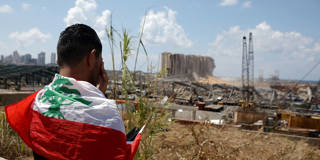The destruction of the port of Beirut – and Lebanon's freefalling economy – has fueled calls to end the country's sectarian political system, which allocates power among Christians, Shia, and Sunni Muslims according to a rigid formula. But might such a change merely deepen suspicion among an already deeply divided population?
WINCHESTER, UK – Haram Lubnan, poor Lebanon. As if hosting more than a million refugees from the Syrian war next door, an economy in free-fall, and COVID-19 weren’t enough, now the catastrophic destruction of the port of Beirut has left more than 150 dead, over 6,000 injured, and some 300,000 – 5% of the population – homeless. What can end this tale of woe for a country whose capital once saw itself as the Paris of the Middle East?

WINCHESTER, UK – Haram Lubnan, poor Lebanon. As if hosting more than a million refugees from the Syrian war next door, an economy in free-fall, and COVID-19 weren’t enough, now the catastrophic destruction of the port of Beirut has left more than 150 dead, over 6,000 injured, and some 300,000 – 5% of the population – homeless. What can end this tale of woe for a country whose capital once saw itself as the Paris of the Middle East?